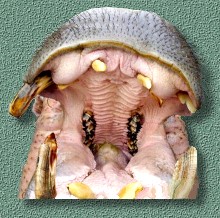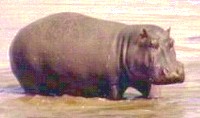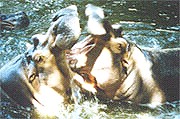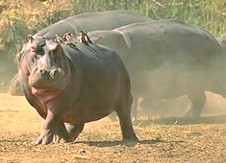 |

Hippopotamus amphibius
'The River Horse'
|

There are two species of hippos, found only in Africa. Little is known about the rare pygmy hippo, which inhabits rain forests and swamps. Much more is known about the large common hippo, which is found in the rivers and lakes in grasslands throughout West and East Central Africa, as shown in orange on the map at the right. Most large groups of hippos live in protected preserves; we'll tell you all about this unusual animal.

The hippopotamus has a huge gray body, with a large head. Its facial features somewhat resemble a pig. Its size can be anywhere up to four and a half metres long, and the hippo can weigh up to 3500 kilograms. It has a lifespan of 20 - 40 years in the wild, longer in captivity.
 Hippos spend all day in the water or wallowing in mud. With its nostrils, eyes, and ears located on the top of its head, the hippo can stay safely underwater without exposing its body; when it submerges, it closes its nostrils and presses it ears tight against its head. An adult hippo can stay underwater for about five minutes. Hippos come up on land to eat in the evening. They're herbivores, and can eat up to 40 kg of vegetation, mostly grasses, during the night. Hippos spend all day in the water or wallowing in mud. With its nostrils, eyes, and ears located on the top of its head, the hippo can stay safely underwater without exposing its body; when it submerges, it closes its nostrils and presses it ears tight against its head. An adult hippo can stay underwater for about five minutes. Hippos come up on land to eat in the evening. They're herbivores, and can eat up to 40 kg of vegetation, mostly grasses, during the night.
The hippo's skin secretes a sticky pink oil, which helps to moisturize it, and to act as a sunscreen in the hot African sun.
Mother hippos are pregnant for 8 months; the baby is born underwater, and has to be able to swim the moment it is born.
 Hippopotami live in groups of fifteen or more, made up of females and their young, as well as a dominant adult male and a few inferior males. Once the dominant male establishes a territory, he will scare off any challengers that threaten his group. Hippopotami live in groups of fifteen or more, made up of females and their young, as well as a dominant adult male and a few inferior males. Once the dominant male establishes a territory, he will scare off any challengers that threaten his group.
 When a hippo yawns, it actually may be showing off enlarged teeth to frighten a trespasser. These teeth can grow up to 50 cm long and are used if a confrontation becomes physical. When a hippo yawns, it actually may be showing off enlarged teeth to frighten a trespasser. These teeth can grow up to 50 cm long and are used if a confrontation becomes physical.
Males ram each other with their mouths open, using their huge heads like sledgehammers and their big mouths as buckets to throw water at each other. Adult males carry the scars of many such encounters, which are seldom fatal.
|

|
Small birds often accompany hippos, riding on their backs and digging parasites out of the hippos' skin.
The hippopotamus kills more people in Africa than the lion! Because so many people live near rivers, bathing and fishing there, the short-tempered hippo is responsible for many deaths.
|
Resources
HTML, graphics & design by Bill Willis 2023
|